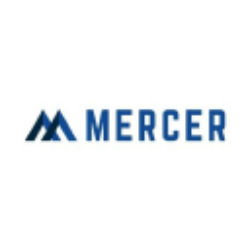
FMP

Mercer International Inc.
MERC
NASDAQ
Mercer International Inc., together with its subsidiaries, manufactures and sells northern bleached softwood kraft (NBSK) pulp in Europe, the United States, Asia, and internationally. The company operates through two segments, Pulp and Wood Products. It also generates and sells green energy produced from biomass cogeneration power plant to third party utilities. In addition, the company manufactures, distributes, and sells lumber and other wood residuals. Further, it produces NBSK pulp primarily from wood chips, pulp logs, and sawlogs; carbon neutral or green energy using carbon-neutral bio-fuels, such as black liquor and wood waste; and tall oil for use as a chemical additive and green energy source. The company sells its pulp to tissue, specialty paper, and printing and writing paper, and other manufacturers; and lumber products to distributors, construction firms, secondary manufacturers, retail yards, and home centers. Mercer International Inc. was founded in 1968 and is headquartered in Vancouver, Canada.
6.58 USD
-0.24 (-3.65%)
DuPont Analysis
The DuPont analysis, pioneered by the DuPont Corporation, offers a structured approach to assessing fundamental performance. It involves breaking down the return on equity (ROE) into various components, aiding investors in comprehending the factors influencing a company's returns.
ROE = Net Income / Average Total Equity
ROE = (Net Income / Sales) * (Revenue / Average Total Assets) * (Average Total Assets / Average Total Equity)
The company's tax burden is (Net income ÷ Pretax profit). This is the proportion of the company's profits retained after paying income taxes. [NI/EBT] The company's interest burden is (Pretax income ÷ EBIT). This will be 1.00 for a firm with no debt or financial leverage. [EBT/EBIT] The company's operating income margin or return on sales (ROS) is (EBIT ÷ Revenue). This is the operating income per dollar of sales. [EBIT/Revenue] The company's asset turnover (ATO) is (Revenue ÷ Average Total Assets). The company's equity multiplier is (Average Total Assets ÷ Average Total Equity). This is a measure of financial leverage. Profitability (measured by profit margin) Asset efficiency (measured by asset turnover) Financial leverage (measured by equity multiplier)